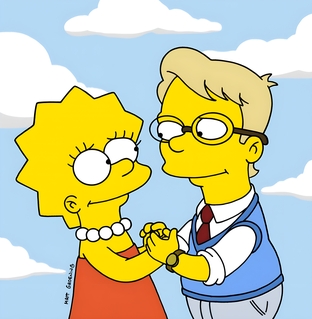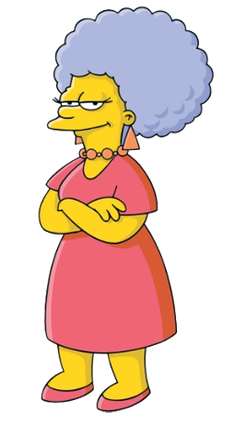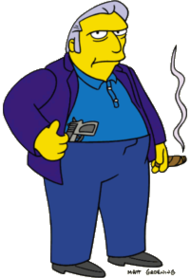
Herschel Shmoikel Pinchas Yerucham Krustofsky, better known by his stage name Krusty the Clown, is a recurring character on the animated television series The Simpsons. He is voiced by Dan Castellaneta. He is the long-time clown host of Bart and Lisa's favorite TV show, a combination of kiddie variety television hijinks and cartoons including The Itchy & Scratchy Show. Krusty is often portrayed as a cynical, burnt-out, addiction-riddled smoker who is made miserable by show business but continues on anyway. He has become one of the most frequently occurring characters outside the main Simpson family and has been the focus of many episodes, some of which also feature Sideshow Bob.

Troy McClure is a fictional character in the American animated series The Simpsons. He was originally voiced by Phil Hartman and first appeared in the second season episode "Homer vs. Lisa and the 8th Commandment". McClure is an actor who is usually shown doing low-level work, most notably hosting manipulative infomercials and questionable educational films. He appears as the main character in "A Fish Called Selma", in which he marries Selma Bouvier to aid his failing career and quash rumors about his personal life. McClure also hosts "The Simpsons 138th Episode Spectacular" and "The Simpsons Spin-Off Showcase".

"Poppa's Got a Brand New Badge" is the twenty-second and final episode of the thirteenth season of the American animated television series The Simpsons. It first aired on the Fox network in the United States on May 22, 2002. In the episode, a massive heatwave causes the residents of Springfield to install large air conditioning devices in their homes. This leads the Springfield Nuclear Power Plant to overload, causing two town-wide blackouts to occur. The Springfield Police Department are unable to face the riots that follow, prompting Homer, dissatisfied with the police's incompetence, to start his own security company, called SpringShield.

"Trilogy of Error" is the eighteenth episode of the twelfth season of the American animated television series The Simpsons, and the 266th episode overall. It originally aired on the Fox network in the United States on April 29, 2001. In the episode, Homer's rush to the hospital to re-attach his severed thumb, Lisa's rush to school to win the science fair, and Bart's run-in with an illegal fireworks scheme are interconnected as each act tells the events of the same day, but from a different point of view.

Patricia Maleficent "Patty" Bouvier and Selma Bouvier-Terwilliger-Hutz-McClure-Discotheque-Simpson-D'Amico are fictional characters in the American animated sitcom The Simpsons. They are identical twins and are voiced by Julie Kavner, who also voices their sister, Marge. Patty and Selma, both gravel-voiced chain-smokers, work at the Springfield Department of Motor Vehicles. They have a strong dislike for their brother-in-law, Homer Simpson, who likewise loathes them. Selma, the elder by two minutes, longs for male companionship and has had multiple brief, doomed marriages, and has herself offered help in some fashion to Marge and Homer as she envies their loving relationship; she receives occasional compassionate support from Homer who even poses as her husband to help her adopt a child. Patty is an initially closeted lesbian who embraces celibacy until she begins dating women. Kavner voices them as characters who "suck the life out of everything". Patty and Selma debuted on the first Simpsons episode "Simpsons Roasting on an Open Fire", which aired on December 17, 1989.

The Simpson family are the main fictional characters featured in the animated television series The Simpsons. The Simpsons are a nuclear family consisting of married couple Homer and Marge and their three children, Bart, Lisa, and Maggie. They live at 742 Evergreen Terrace in the fictional town of Springfield, United States, and they were created by cartoonist Matt Groening, who conceived the characters after his own family members, substituting "Bart" for his own name. The family debuted on Fox on April 19, 1987, in The Tracey Ullman Show short "Good Night" and were later spun off into their own series, which debuted on Fox in the U.S. on December 17, 1989, and started airing in Winter 1989.
"Insane Clown Poppy" is the third episode of the twelfth season of the American television series The Simpsons. It originally aired on the Fox network in the United States on November 12, 2000. In the episode, during an outdoor book fair, Krusty finds out he has a daughter, but loses her trust after gambling away her violin to Fat Tony, prompting Homer and Krusty to retrieve it.
"Grift of the Magi" is the ninth episode of the eleventh season of the American animated television series The Simpsons. Being the final episode to air in the 1990s, it originally aired on the Fox network in the United States on December 19, 1999. In the episode, mafia boss Fat Tony successfully extorts a large sum of money from Springfield Elementary School, forcing Principal Skinner to close it down. However, a toy company called Kid First Industries, led by Jim Hope, later buys the school and privatizes it. Classes now start focusing on toys and marketing only, and soon a new toy called Funzo that resembles the children's ideas is released by Kid First Industries in time for the Christmas shopping season. Bart and Lisa decide to destroy all Funzos in Springfield but Gary Coleman, Kid First Industries' security guard, tries to intercept them.
"It's a Mad, Mad, Mad, Mad Marge" is the twenty-first and penultimate episode of the eleventh season of the American animated television series The Simpsons. It first aired in the United States on the Fox network on May 14, 2000. After a failed marriage attempt with Otto, Becky stays with the Simpson family. However, Marge begins to get paranoid at her family's newfound love of Becky, and begins to think that she is seducing Homer.

"The Blunder Years" is the fifth episode of the thirteenth season of the American animated television series The Simpsons. It originally aired on the Fox network in the United States on December 9, 2001. The episode sees Homer, after being hypnotized by the hypnotist Mesmerino while having dinner at the restaurant Pimento Grove, reminded by a repressed traumatic experience from his childhood, including the moment he discovered the dead body of Waylon Smithers' father while having a fun at an abandoned mine. The Simpsons set out to find the corpse that triggered Homer's psychological trauma, which evolves into a murder mystery later in the episode.

"Homie the Clown" is the fifteenth episode of the sixth season of the American animated television series The Simpsons. It originally aired on the Fox network in the United States on February 12, 1995. In the episode, Homer becomes a Krusty the Clown impersonator, but is mistaken for the real Krusty by the Springfield Mafia. Joe Mantegna returned as Fat Tony, while Dick Cavett and Johnny Unitas guest starred as themselves.

"Homer vs. the Eighteenth Amendment" is the eighteenth episode of the eighth season of the American animated television series The Simpsons. It originally aired on the Fox network in the United States on March 16, 1997. In the episode, Springfield enacts prohibition after a raucous Saint Patrick's Day celebration. To supply Moe's speakeasy, Homer becomes a bootlegger. The episode was written by John Swartzwelder and directed by Bob Anderson. Dave Thomas guest stars as Rex Banner and Joe Mantegna returns as Fat Tony.
"Bart the Murderer" is the third episode of the third season of the American animated television series The Simpsons. It originally aired on the Fox network in the United States on October 10, 1991. In the episode, Bart stumbles upon a Mafia club after having bad luck at school. The owner of the bar, mobster Fat Tony, hires Bart as a bartender. When Principal Skinner goes missing after punishing him at school, Bart is put on trial for his murder.

The seventh season of the American animated television series The Simpsons originally aired on the Fox network between September 17, 1995, and May 19, 1996. The show runners for the seventh production season were Bill Oakley and Josh Weinstein who would executive produce 21 episodes this season. David Mirkin executive produced the remaining four, including two hold overs that were produced for the previous season. The season was nominated for two Primetime Emmy Awards, including Outstanding Animated Program and won an Annie Award for Best Animated Television Program. The DVD box set was released in Region 1 on December 13, 2005, Region 2 on January 30, 2006, and Region 4 on March 22, 2006. The set was released in two different forms: a Marge-shaped box and also a standard rectangular-shaped box in which the theme is a movie premiere.

The sixth season of the American animated television series The Simpsons originally aired on the Fox network between September 4, 1994, and May 21, 1995, and consists of 25 episodes. The Simpsons is an animated series about a working class family, which consists of Homer, Marge, Bart, Lisa, and Maggie. The show is set in the fictional city of Springfield, and lampoons American culture, society, television and many aspects of the human condition.

The third season of the American animated television series The Simpsons originally aired on the Fox network between September 19, 1991, and August 27, 1992. The showrunners for the third production season were Al Jean and Mike Reiss who executive produced 22 episodes for the season, while two other episodes were produced by James L. Brooks, Matt Groening, and Sam Simon, with it being produced by Gracie Films and 20th Century Fox Television. An additional episode, "Brother, Can You Spare Two Dimes?", aired on August 27, 1992, after the official end of the third season and is included on the Season 3 DVD set. Season three won six Primetime Emmy Awards for "Outstanding Voice-Over Performance" and also received a nomination for "Outstanding Animated Program" for the episode "Radio Bart". The complete season was released on DVD in Region 1 on August 26, 2003, Region 2 on October 6, 2003, and in Region 4 on October 22, 2003.

"Donnie Fatso" is the ninth episode in the twenty-second season of the American animated television series The Simpsons. It first aired on the Fox network in the United States on January 2, 2011. The plot revolves around an FBI agent, who helps Homer go undercover to infiltrate Fat Tony's mob. Homer agrees to help the FBI in order to reduce his prison sentence on a bribery conviction. This episode is a reference to Goodfellas as well as real-life FBI agent Donnie Brasco.
"The Real Housewives of Fat Tony" is the nineteenth episode of the twenty-second season of the American animated television series The Simpsons. It first aired on the Fox network in the United States on May 1, 2011. This episode mainly centers around Marge Simpson and one of her older sisters, Selma, who falls in love with mobster Fat Tony. Selma later begins the glamorous lifestyle associated with being in the Mafia and the couple agrees to marry each other. The marriage leads to tension between Marge and Selma. Fat Tony later invites Homer and Marge to his mansion in New Jersey, in hopes of mending the sisters' relationship. Meanwhile, Bart acquires an ability to trace the location of truffles, which leads Lisa to attest to her growing greed for eating truffles.















